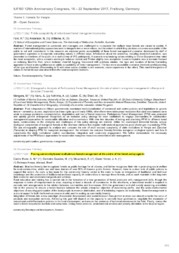Placing community-based multiple-use forest management at the centre of the forest policy agenda.
Placing community-based multiple-use forest management at the centre of the forest policy agenda.
Author(s): EULER, A. M. C.; GUEDES, M. C.; MOCHIUTTI, S.; YARED, J. A. G.
Summary: Brazilian forestry law recognizes forests as public heritage for all citizens, and further recognizes their role in promoting social welfare for rural communities, which use and have domain of over 50% of Amazon public forests. However, there is a clear lack of public policies to support this notion. As such, a key issue for the community forestry sector is the need to focus on integration of traditional and technical knowledge and the promotion of institutional and local capacity of communities to manage these forests, and as such maintain in the long-term their economic and environmental goods and services. Rural education and training has a central role in the formation of a new generation of forest producers with management skills, though the response in terms of empowerment is slow, requiring at least a decade of investments. In the short-term, a transitional model is required to promote new arrangements in the relation between communities and businesses. With the government and civil society assuming a mediator role in the process to ensure a better balance between the private enterprise objective of maximizing profits, and the socio-environmental objectives of assuring participation of the local people in revenue distribution, and of minimizing impacts on biodiversity. Shared management is a crucial aspect for both the forest concession model, and for scaling up community forestry. Integration of forests into a new paradigm of economic development and social inclusion through their multiple use should consider the value of products and ecosystem services. Achieving this goal will depend on the capacity to promote local governance, negotiate the expansion of educational and infrastructure policies in the rural environment, and ensure the presence of technical assistance in the field. Finally, comes the need to foster responsible markets and consumers, linking forest products, environmental services and poverty alleviation in the tropical region.
Publication year: 2017
Types of publication: Abstract in annals or event proceedings
Unit: Embrapa Amapá
Observation
Some of Embrapa's publications are published as ePub files. To read them, use or download one of the following free software options to your computer or mobile device. Android: Google Play Books; IOS: iBooks; Windows and Linux: Calibre.
Access other publications
Access the Agricultural Research Database (BDPA) to consult Embrapa's full library collection and records.
Visit Embrapa Bookstore to purchase books and other publications sold by Embrapa.

